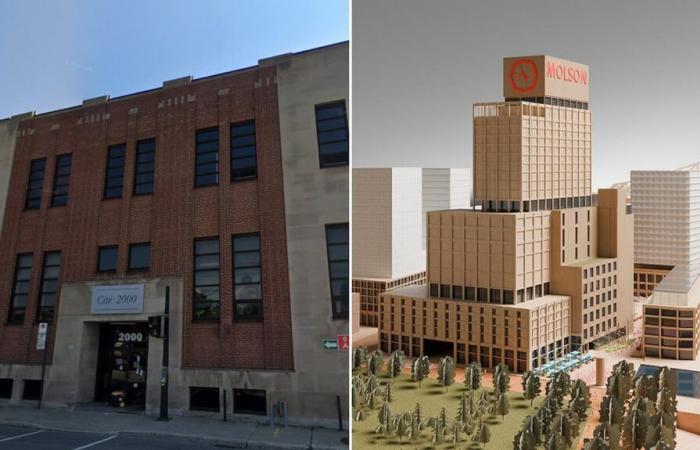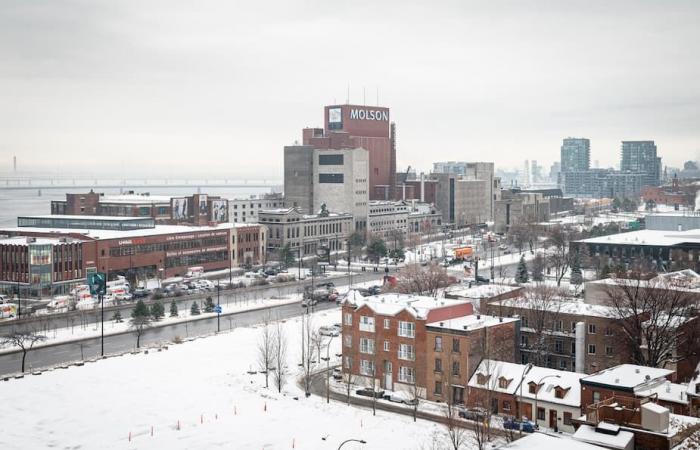An imposing real estate project which will be installed on the site of the former Molson brewery, in Montreal, promises to build a whole new neighborhood in an abandoned area. But musicians who play in Cité 2000, the neighboring building, are worried about seeing their place of practice closed, while cultural institutions have recently suffered from noise complaints.
• Also read: “When we arrived, it was already moldy”: hundreds of Montreal musicians, including Coeur de pirate, flooded
• Also read: Another performance hall closes due to noise in Montreal
“We have already seen this problem manifest for several years, causing, among other things, the closure of La Tulipe, a legendary performance hall. The fears are very real regarding Cité 2000,” says Antoine Trudel, a musician who holds a lease for a rehearsal studio.
The building, which U-Haul owns, has 215 studios, in addition to storage spaces. It is the largest rehearsal venue in Montreal.
Several musicians contacted by 24 hours are also worried about the future of Cité 2000 after the announcement of the Quartier Molson project. Between the Jacques-Cartier Bridge and Atateken Street, the project will include 5,000 housing units, businesses, a hotel, offices and green spaces providing access to the St. Lawrence River.
Illustration provided by Groupe Montoni
Graphic rendering of the scope of the Quartier Molson project. Cité 2000 is the brown building to the right of the Molson Tower.
Does the fate that La Tulipe experienced await Cité 2000 in seven to ten years, once construction is completed?
“We don’t see any problems with cohabitation at this point,” assures Frédérick Truchon-Gagnon, director of communications for Groupe Montoni, the project’s real estate developer.
“From a business point of view, I see the potential. The project will bring necessary housing, it will completely change the area, which is very industrial, to make it lively and residential,” underlines Steve Marcoux, president of the Boîte à musique, a studio rental company in the area. Cité 2000 and a shop.
“But on the music side, if it makes too much noise, will the neighborhood complain? Will this push artists to go elsewhere?
Neighbor of the “social heart”
Planned where the current Molson Tower is located, the Voltigeurs block will be the “social heart of the neighborhood,” explains Frédérick Truchon-Gagnon. Bringing together part of the housing, shops, offices and a hotel, it will be the immediate neighbor of Cité 2000, according to the plans presented to the City.
This proximity to the residential portion of the project concerns the tenants of Cité 2000.
• Also read: Is everything bad in Montreal? We asked Valérie Plante and other personalities
“If there are noise complaints, will U-Haul invest in soundproofing or in finding a way to resolve the sound problem? I don’t think so,” Steve Marcoux fears.
“U-Haul is first and foremost a truck and warehouse rental company. For them, it would be easier to convert the rehearsal spaces into mini-warehouses than to fight noise complaints. In the end, it’s still the artists who will take the hit,” adds Antoine Trudel.
Asked about this, the company did not respond to questions from 24 hours.
An important place in the underground scene
Much more than a place where musicians can rehearse, Cité 2000 represents a hub of Montreal’s underground scene. It has hosted big names in the industry, including Anonymous, Despised Icon and Voivod.
“Everyone who has made music — whether amateurly or professionally — has already passed through the walls of Cité 2000 to rehearse, for storage or as a meeting point,” illustrates Steve Marcoux.
Photo Agence QMI, JOEL LEMAY
The possible closure of Cité 2000 would deprive the city of “a community, a place to meet improbable people, a living environment,” he said.
“Musicians are resourceful little creatures who make do with little. If Cité 2000 hadn’t been there, it wouldn’t have stopped them from playing music. But the fact that the City was there made it much easier,” he adds.
“Removing the possibility of rehearsing at Cité 2000 means pushing musicians against the wall and, ultimately, it will have consequences on cultural life in Montreal. There will be fewer artists, fewer shows […] “it will lower the quality of life in a city that wants to be the cultural capital of the country,” warns Antoine Trudel.







